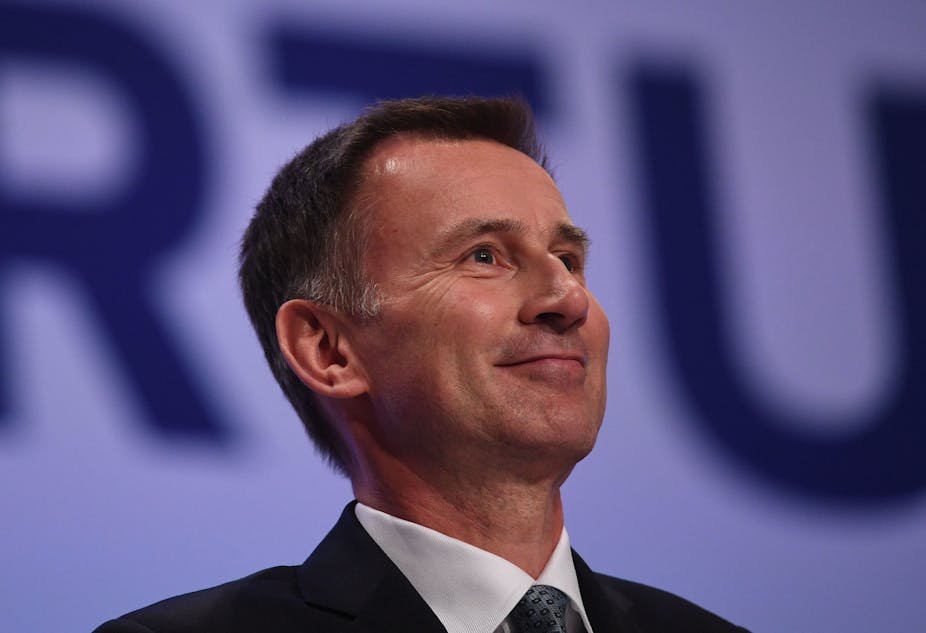Foreign secretary Jeremy Hunt caused a stir after his Conservative party conference speech, during which he compared the European Union to the Soviet Union, stating:
What happened to the confidence and ideals of the European dream? The EU was set up to protect freedom. It was the Soviet Union that stopped people leaving. The lesson from history is clear: if you turn the EU club into a prison, the desire to get out won’t diminish it will grow … and we won’t be the only prisoner that will want to escape … If you reject the hand of friendship offered by our prime minister … you turn your back on the partnership that has given Europe more security, more freedom and more opportunities than ever in history … and a setback for the EU will become a wholly avoidable tragedy for Europe.
Academics give their view on how Hunt’s remarks will affect Brexit negotiations at this critical stage.
Richard Whitman, Professor of Politics and International Relations at University of Kent
Hunt’s speech was a crowd pleaser at the Conservative party conference but it generated considerable negative coverage in other European capitals. Using language that compared the EU to the Soviet Union was spectacularly mistimed. The UK is about to embark on a final push for a withdrawal agreement from the EU and can’t afford to antagonise it.
Thus far, the UK has pursued a “workaround” diplomatic strategy for Brexit. Instead of focusing entirely on dealing with Brussels, it has attempted to influence the European Commission’s stance by appealing to national governments and by sending ministers to visit European capitals to sell the Chequers deal.
The EU’s Baltic member states have been seen as relatively sympathetic to the UK in the Brexit negotiations so far. The strength of the reaction coming from the region’s diplomats after Hunt’s comments illustrates just how ill-advised they were. Tiina Intelmann, the Estonian ambassador to London, described the comparison as “insulting”.
When Hunt was chosen to replace Boris Johnson as foreign secretary, the news was greeted positively in European capitals. Johnson was seen as a detrimental influence on UK Brexit policy and a poor performer in his diplomatic role. Hunt had the opportunity to reset relationships with his fellow EU foreign ministers. The party conference speech will not have eased this task.
Hunt’s remarks fall in line with the rhetoric adopted by the UK government since the EU’s Salzburg summit, but will do him no favours in his new position. The UK government has held to its line that the Chequers deal is the basis for an agreement with the EU.
For the future, Hunt could usefully reflect on Harold Macmillan’s comment on the role of foreign secretary, delivered in the House of Commons in 1955:
Nothing he can say can do very much good, and almost anything he may say may do a great deal of harm.
Agnes Batory, Professor of Public Policy at Central European University
The EU is not the Soviet Union – it simply cares more about continuing members than quitters. Jeremy Hunt’s recent comparison of the EU to the Soviet Union, during his Conservative party conference speech, was rightly rebuked by EU policy-makers, as well as former senior British civil servants. The reasons are obvious: the EU was formed voluntarily by like-minded states and is governed by the rule of law – unlike that other union, which was created and maintained by coercion and oppression.
Looking at the comment from the perspective of one of the “new” member states, including Estonia, Latvia and Lithuania, many will see the comparison as offensive. Having suffered under Soviet rule, their countries worked hard to join this current union, and feel that EU membership has delivered peace and prosperity. Of course, not everyone would agree: Hunt has the dubious distinction of parroting Hungary’s populist prime minister, Viktor Orban, who drew a parallel between “Moscow” and “Brussels” years ago.
Hunt himself seemed to recognise that the comment was ill-advised, when he tried – and failed – to explain himself, claiming that he simply reacted to the EU trying to “punish” the UK for wanting to leave. And this is where an observer from the continent throws up her hands in despair.
It beggars belief that the head of the British Foreign Office still seems to fail to grasp the nature of the Brexit negotiations – even if the speech was delivered to Tory party faithful. It implies that Hunt and his colleagues continue to believe that the UK is somehow entitled to demand the EU puts Britain first, ahead of the interests of its member states. This simply will not happen. Cherry picking is not an option, and never has been. An obstinate insistence that it be allowed, lest the UK feels punished, will not serve the British public well.

